Colorado Criminal Law: What Is A “Jasper” Plea Bargain Deadline Date?
By H. Michael Steinberg, Colorado Criminal Defense Lawyer
Introduction – The Jasper Plea Bargaining Deadline Date
Lawyers in the criminal courts of Colorado owe their clients detailed explanations of the often confusing and frightening world that is the criminal justice system. One of the procedures commonly used by Colorado’s judges includes the use of the Jasper date.
In short, after a “Jasper cut-off date” has expired, all plea negotiations must end. Unless the trial judge finds good cause to allow a plea bargain to occur after the deadline has passed, the case is literally forced to trial with no possibility of a plea bargain.
The only other option, short of trial, requires the Draconian impact of a Defendant left only with the requirement to plead guilty to ALL the charges with a completely “open” sentencing hearing (e.g. all sentencing on every count is left to the full discretion of the judge).
With the significant backlog of trials now clogging Colorado’s courtrooms, one of the procedures gaining in importance in this post-pandemic world – is the increased use of the Jasper plea bargaining deadline.
The Only Element of the Jasper Cut Off Date – Clear and Adequate Notice to the Parties
The Colorado Supreme Court in 2001, in the Jasper case, held that Colorado’s judges possess the inherent authority to impose a plea cutoff deadline as part of a judge’s case management responsibilities and that it is not an abuse of a Judge’s discretion “for a trial court to reject a plea bargain solely for failure to tender it before a court-imposed plea deadline.” Jasper
The only requirement for a judge to properly set a Jasper deadline is that the Court provide clear notice of the expiration of that deadline. While the timing of the “Jasper order” is up to the discretion of the Judge, the time given to negotiate a plea if that is going to happen must be “adequate” to place the parties on reasonable notice.
Adequate time for the setting of a Jasper deadline usually turns on the complexity of the case – the more complex the case, such as a homicide case, the more time is necessary to allow the parties enough time to reasonably conclude their negotiations.
While not a requirement, most Jasper plea bargaining cut-off orders are in writing and not orally issued from the Bench.
The “Good Cause Exception” to the Jasper Cut-Off Date Deadline
The Colorado Supreme Court, in the Jasper case, provided a possible “escape hatch” or “back door” for those parties who have missed the Jasper deadline. This escape hatch is called the “good cause exception.”
In order to prevent what the Jasper court would view as an “arbitrary rejection” of an untimely plea agreement, a trial court is required to provide, not only adequate notice to the parties of the plea cut-off deadline, but also the opportunity to establish “good cause” for exceeding that deadline.
The Jasper court placed the burden of proof of establishing good cause on the parties asserting that they come within the exception. Put more directly, if the parties to a proposed plea agreement seek to tender a plea after the Jasper deadline has passed, they have the burden to establish good cause to bypass the deadline to the judge’s satisfaction because:
“The parties, as the proponents of a plea agreement, are in the best position to inform the court of facts and circumstances that constitute good cause, and thus bear this burden to explain why they missed the deadline.” Jasper
The same judge who set the Jasper deadline determines whether the burden of proof for good cause has been met.
Finally, it must be said that if the parties fail to specifically inform the court of facts constituting good cause, they have waived any objection to the Court’s enforcement of the deadline.
How is Good Cause Defined?
The good cause limitation on a trial court’s discretion to enforce a Jasper deadline and to reject an untimely plea bargain does NOT require that a judge considers the merits of the proposed plea agreement. Good cause has nothing to do with the fairness of the plea agreement. Good cause ONLY addresses the explanation of why the parties failed to tender the plea agreement in a timely manner.
While detailed guidelines do not exist for what constitutes good cause (that finding is left to the sound discretion of the trial court) it can be described as an “elastic” concept that is more than “a mere change of mind or a renegotiation by the parties.”
Good cause was referenced in Jasper as follows:
“Good cause exists in exceptional circumstances, such as when unforeseen events occur after the plea cutoff deadline that changes the positions of the parties.”
More specifically, good cause means:
“the underlying eventuality that was unforeseen, was not due to lack of preparation, is relevant, is brought to the court’s attention in a timely manner, and does not prejudice the adversary.”
The Legal Authority Underlying the Jasper Plea Bargaining Deadline Date
Colorado has no rule that expressly provides that a court may exercise its discretion by enforcing a plea cut-off deadline. The power of a judge to do so is an inherent part of the authority of the courts to control their dockets. Presently, Colorado’s judges enforce pretrial deadlines upon the parties in other ways in the exercise of their responsibility to manage their criminal dockets.
Two Other Examples: Under Colorado Crim. P. Rule 16(V)(b)(1) judges can set deadlines for a defendant to disclose statements of experts and the nature of the defense to the prosecution. And under Colorado Crim. P. Rule 16(V)(b)(3) judges are allowed to alter discovery time limits if either party shows good cause to do so.
The setting of deadlines for all pretrial matters, such as the Jasper order, is consistent with the Court’s case management authority. Those who practice criminal law in the courts of Colorado well understand the force of “calendar management rules” such as the setting of briefing, motions, and trial deadlines.
Because there is no constitutional right to a plea agreement, there will always be times when the promotion of “efficient judicial administration” and “docket management tools” trump a defendant’s right to control the course of a criminal case.
Summary and Conclusion – Colorado Criminal Law: What Is The“Jasper” Plea Bargain Deadline?
While the Jasper case was decided over 20 years ago, it is still good law in Colorado.
Litigants in criminal court must recognize and carefully note that the Jasper deadline is real and well within the inherent authority of a Colorado judge. It is only one of several serious deadlines a judge may exercise pursuant to the court’s case management authority.
The parties to any plea agreement must be careful and diligent not to miss this court-imposed plea cut-off deadline. If it is passed, while the Court must consider the reasons given by the parties to try to fit within the good cause exception to the judge’s Jasper plea bargaining deadline, the ultimate finding of “good cause” rests with the judge – the same person who set the deadline.
Nothing should ever be assumed.
If a judge finds that the reasons for missing the deadline to justify an exception to the cut-off date are insufficient, then the Jasper case allows the court to reject a plea agreement and force the case to trial or a plea of guilty to all charges.
An appeal of the decision under Jasper would fall within an “abuse of discretion” level of authority of the judge and will therefore almost always be affirmed.
 “A person charged with a crime requires the guiding hand of counsel at every step in the proceedings against him. Without it, though he be not guilty, he faces the danger of conviction because he does not know how to establish his innocence.”
“A person charged with a crime requires the guiding hand of counsel at every step in the proceedings against him. Without it, though he be not guilty, he faces the danger of conviction because he does not know how to establish his innocence.”
United States Supreme Court – Powell v. Alabama, 287 U.S. 45, 69 (1932)
If you found any information I have provided on this web page article helpful, please share it with others over social media, so they may also find it. Thank you.
Never stop fighting – never stop believing in yourself and your right to due process of law.
ABOUT THE AUTHOR: H. Michael Steinberg – Email The Author at hmsteinberg@hotmail.com – A Denver, Colorado Criminal Defense Lawyer – or call his office at 303-627-7777 during business hours – or call his cell if you cannot wait and need his immediate assistance – 720-220-2277. Attorney H. Michael Steinberg is passionate about criminal defense. His extensive knowledge of Colorado Criminal Law and his 38 plus years of experience in the courtrooms of Colorado may give him the edge you need to properly defend your case.
As a former career prosecutor for Arapahoe and Douglas Counties, he has a unique understanding of the criminal justice system that works to his clients’ advantage to better protect their rights. H. Michael also knows how to talk clearly and very directly to his clients, his adversaries, and to the Court. He uses his life experience, common sense, and straight talk to help clients fully understand and make decisions regarding their options.
If you are ready to talk, H. MIchael stands ready to help.
 Colorado Criminal Lawyer Blog
Colorado Criminal Lawyer Blog

